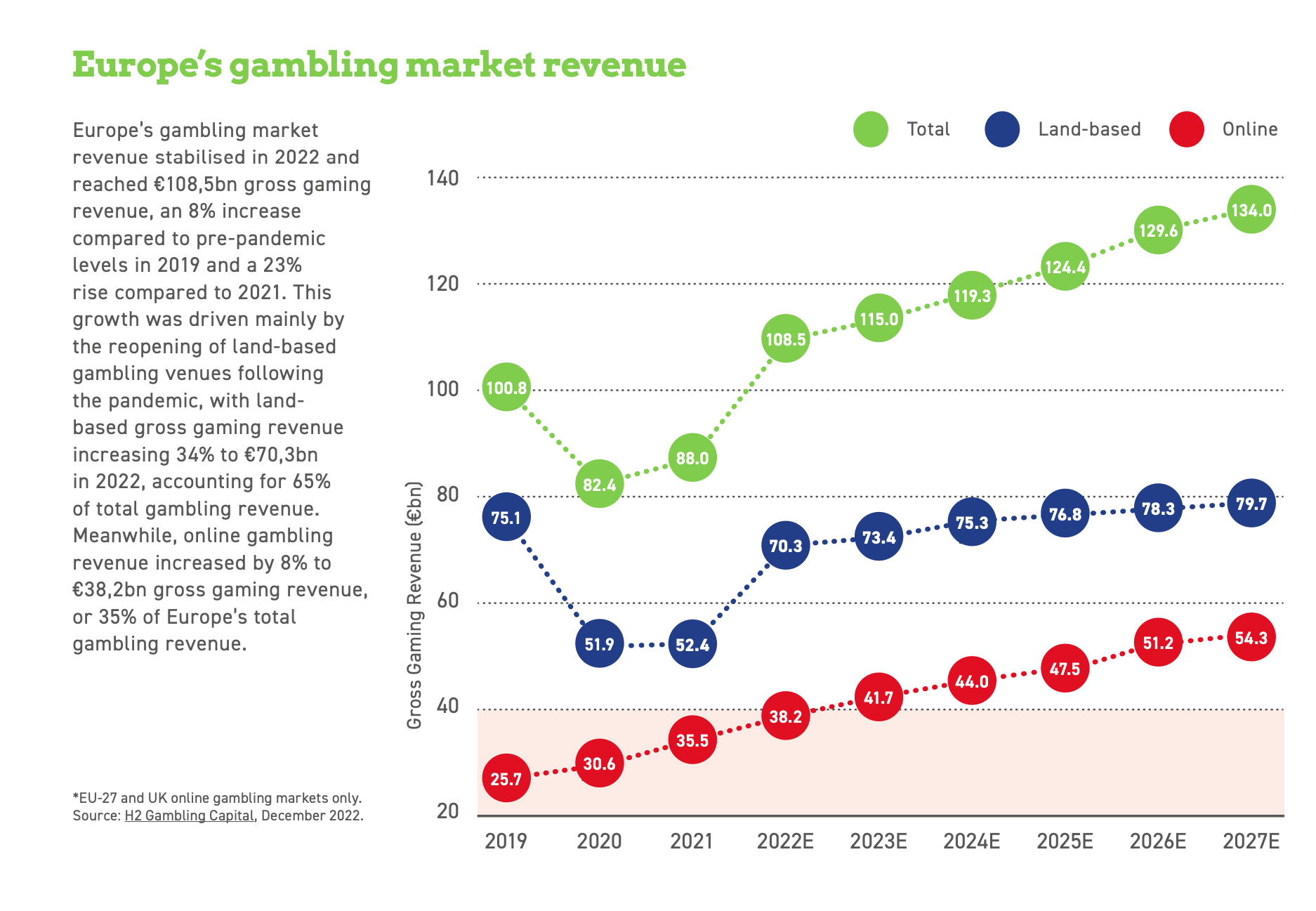
In today’s digital age, few industries have displayed the remarkable growth and dynamism that iGaming has. The intersection of technology, accessibility, and human engagement has made iGaming a titan in the digital world. But as it continues to evolve, the heart of its success remains rooted in its workforce. For anyone considering a venture in this industry, understanding its landscape and the pivotal role of the team is imperative.
In 2022, Europe’s gambling market revenue witnessed stabilisation, hitting €108.5bn in gross gaming revenue. This represented an 8% hike compared to figures from 2019, before the pandemic, and a notable 23% jump from 2021. The significant growth can primarily be attributed to the reopening of terrestrial gambling venues post-pandemic. Land-based gross gaming revenue surged by 34%, amounting to €70.3bn in 2022 and making up 65% of the overall gambling revenue. On the other hand, online gambling revenue saw an 8% rise, culminating in €38.2bn gross gaming revenue, which accounted for 35% of the entire gambling revenue in Europe.

Source: https://www.egba.eu/eu-market/
Understanding iGaming’s Digital Supremacy
The iGaming sector’s explosive growth can be attributed to several key factors:
- Technological Innovations: Advanced gaming platforms, VR/AR incorporations, and innovative game designs keep the industry fresh and players continually engaged. These innovations have not only enhanced user experience but have also made gaming more interactive and immersive.
- Increasing Internet Penetration: With the global expansion of internet access, especially in previously underrepresented regions, there’s a larger audience than ever before. This accessibility opens doors to new markets and demographics, further driving growth.
- Engaged User Base: Unlike many other industries, iGaming has a community that’s passionate, engaged, and vocal. This creates a positive feedback loop, where game developers can directly incorporate player feedback, fostering loyalty and engagement.
- The Cornerstone of Success: Your Team
However, behind this technological facade lies the real driving force – the team.
Here’s why:
- Industry Expertise: The iGaming landscape is intricate. Having team members with deep industry knowledge can help navigate the complexities, be it in game development, licensing, or market strategies.
- Innovation & Creativity: The heart of iGaming is its games. A dedicated team of game designers and developers who are not only technically skilled but also creatively charged is essential to keep the offerings fresh and competitive.
- Feedback Loop: A robust customer support and community management team can keep the feedback loop intact. This helps in understanding player needs and refining the gaming experience accordingly.
- Navigating Legal Landscapes: Given the stringent regulations in many regions, having a competent legal and compliance team is non-negotiable.
The iGaming industry is burgeoning, with numerous startups entering the field hoping to gain a slice of the lucrative market. For these startups, establishing a strong foundation is imperative. This starts by assembling a robust team to drive the vision forward. So, which roles are indispensable for an iGaming startup? Let’s delve deeper:
1. Founder/CEO: The Guiding Force
Every adventure requires a leader, someone at the helm steering the ship towards success. In the context of an iGaming startup, this role is even more pronounced.
- Visionary: The CEO holds and nurtures the company’s vision. They are responsible for setting the direction and ensuring that all aspects of the business align with this overarching goal.
- Industry Expertise: A profound understanding of the gaming world is non-negotiable. The CEO should be familiar with industry trends, potential challenges, and emerging opportunities. This knowledge ensures that the startup remains competitive and innovative.
- Resource Allocator: Startups often operate with limited resources. The CEO ensures these resources, whether financial, human, or technological, are effectively deployed to maximise returns.
- Inspiring Leadership: Beyond strategy and resources, a CEO’s most significant role might be their capacity to inspire. Building a startup is challenging, filled with highs and lows. A CEO’s leadership qualities should motivate the team, fostering a culture of collaboration, resilience, and innovation.
The iGaming sector is ripe with potential, but seizing this potential demands more than just a great idea. It necessitates a well-rounded team, starting with a CEO who possesses a blend of industry expertise, strategic thinking, and outstanding leadership capabilities. For startups looking to make their mark in the iGaming universe, identifying and nurturing such talent should be a top priority.
2. The Role of a CTO in iGaming: Steering the Tech Ship
In the ever-evolving landscape of iGaming, technology sits at the very heart of operations. As the sector continues to expand, fueled by the fusion of gaming enthusiasm and technological advances, the need for a competent Chief Technical Officer (CTO) has never been more pronounced.
- Chief Technical Officer (CTO): The Tech Maestro in iGaming. The iGaming arena is teeming with opportunities, but it’s the technical prowess behind the scenes that ensures a seamless gaming experience for users. Here’s why the CTO is indispensable in this ecosystem:
- Technical Oversight: In an industry where milliseconds can affect user experience, the CTO ensures that every technical aspect, from the robustness of the platform to the smooth running of games, is in tip-top shape.
- Visionary Tech Leadership: A competent CTO isn’t just about managing the present; they’re about envisioning the future. With the pace at which technology evolves, especially in the gaming sector, a CTO needs to be forward-thinking. They should anticipate industry shifts, whether in terms of gaming preferences, platform evolution, or security threats.
- Adaptation and Evolution: The world of iGaming is dynamic. New trends emerge, player expectations shift, and technology advances. A CTO is at the forefront of this evolution, ensuring that the company’s tech backbone is agile and adaptable.
- Collaborative Spirit: While they’re tech experts, a successful CTO in the iGaming sector also understands the importance of collaboration. Working closely with game developers, designers, and marketing teams, they ensure that the technical facet aligns perfectly with the business’s broader objectives.
The booming iGaming sector demands a solid technical foundation, and at the centre of this is the CTO. Their role goes beyond mere management; it’s about envisioning the future, embracing change, and ensuring that the startup remains at the cutting edge of technological innovations in the iGaming world.
3. The Unseen Heroes of iGaming: Game Developers
The ever-evolving domain of iGaming is filled with excitement, challenges, and opportunities. But have you ever paused to think about what really powers this industry? It’s the intricate coding, the vivid graphics, the thrilling narratives, and the seamless gameplay – all brought to life by the brilliant minds of game developers.
- Game Developers: Crafting Virtual Realities in iGaming. When you step into the world of iGaming, you’re immersing yourself in a universe crafted meticulously by game developers. Here’s a glimpse into their paramount role in the iGaming ecosystem:
- Breathe Life into Games: A game on any platform is more than just lines of code. It’s an experience, a journey, a challenge. Game developers ensure this experience is smooth, engaging, and in line with the expectations of the avid gamer. They’re the architects of the gaming universe, ensuring every element, from graphics to gameplay mechanics, meshes seamlessly.
- Versatility is Key: The realm of iGaming is vast, spanning mobile games, desktop games, slots, live games, and more. Depending on the startup’s direction, developers might wear multiple hats. Whether they’re coding for the responsiveness of mobile platforms or the expansiveness of desktop platforms, their role is crucial.
- Innovation and Engagement: The iGaming landscape is highly competitive. For a game to stand out, it has to be unique, captivating, and fun. Developers are at the forefront of integrating new technologies, designing inventive gameplay mechanics, and ensuring games remain engaging over time.
- Feedback Loop and Iteration: The best game developers in the iGaming sector understand the value of feedback. They work in close tandem with players, testers, and other team members to refine games, fix bugs, and improve the overall gaming experience.
The iGaming industry, with its rapid growth and ever-increasing player base, hinges on the innovation and expertise of game developers. They’re not just developers; they’re storytellers, artists, and problem solvers, playing an instrumental role in shaping the virtual gaming realms we so dearly love.
4. Game Designers: The Visionaries Behind Every iGaming Adventure
In the rapidly growing world of iGaming, every game is a universe waiting to be explored. And at the helm of this cosmos, orchestrating every detail and emotion, are the game designers. They are the masterminds, turning imaginative ideas into tangible experiences that millions revel in.
- Game Designers: More than Just Designing
- The Blueprint Masters: Just as an architect draws up plans for majestic buildings, game designers sketch the outline for virtual adventures. They visualise the game’s journey, from its inception to the climactic battles and eventual rewards. It’s their vision that guides every other aspect of game development.
- Crafting the Narrative: Beyond the gameplay mechanics and graphics lies the heart of the game – its story. Game designers are also storytellers. They weave intricate tales that provide context, motivation, and depth, ensuring players are not just playing, but are engrossed in a narrative.
- Understanding the Audience: One of the paramount responsibilities of game designers in the iGaming sector is to know their audience. Whether it’s a slot game aimed at casual players or a complex strategy game for hardcore gamers, designers ensure the game resonates with its target demographic, balancing challenge and reward.
- Collaboration is Key: Game designers don’t work in isolation. They constantly collaborate with developers, artists, and sound engineers to ensure the game’s vision is realised flawlessly. They act as the bridge, ensuring all elements come together cohesively.
- Evolution and Innovation: The iGaming landscape is ever-changing. Game designers stay abreast of trends, player feedback, and technological advancements. They iterate, innovate, and refine, ensuring their games are always at the forefront of the industry.
5. Quality Assurance in iGaming: Perfecting the Player Experience
In the fast-paced realm of iGaming, there’s no room for mistakes. With players expecting seamless experiences and unadulterated enjoyment, the pressure is on for game developers. Yet, between the design sketches and the final product lies a critical phase: Quality Assurance (QA). These unsung heroes, the QA testers, play a pivotal role in ensuring that every game is not just good but exceptional.
- Quality Assurance: Beyond Just ‘Testing’
- Guardians of Gameplay: QA testers don’t just play games; they dissect them. They’re on the lookout for anything amiss—be it a minor graphical glitch, a major crash, or even gameplay imbalances. Their meticulous approach ensures that when players embark on a gaming adventure, it’s a smooth ride.
- A Player’s Perspective: While developers and designers might get caught up in the mechanics and the vision, QA testers approach games from the player’s viewpoint. They ensure that the user experience is intuitive, enjoyable, and devoid of frustrations.
- Collaborative Excellence: QA isn’t a solitary endeavor. Testers work closely with game developers and designers, offering feedback and driving iterations. Their collaborative efforts ensure that when a game finally reaches its audience, it’s in its best possible version.
- Adapting to Evolving Tech: The iGaming industry is driven by technology. With new devices, platforms, and software updates rolling out continually, QA testers stay updated. They ensure games are compatible across devices, ensuring a broad player base can enjoy without hitches.
- Keeping the Brand Reputation Intact: In the world of online reviews and instant feedback, even a small bug can tarnish a brand’s reputation. By ensuring flawless gameplay, QA testers indirectly play a role in brand building and maintaining trust among the player community.
Quality Assurance in the iGaming sector isn’t just about finding and fixing bugs—it’s about crafting impeccable player experiences. As the iGaming landscape continues to expand and evolve, the role of QA testers will remain invaluable. They are, after all, the last line of defence between the developer’s desk and the player’s screen, ensuring that every game is a masterpiece.
6. The Pulse of iGaming: Marketing & Community Management
In the digital landscape of iGaming, having a fantastic game is only half the battle won. The real challenge? Making sure players know about it, love it, and stick with it. Enter the unsung heroes of the gaming world: Marketing & Community Managers. These professionals bridge the gap between developers and players, ensuring that not only is the game discovered but also cherished and celebrated.
- Marketing & Community Management: Where Strategy Meets Engagement
- Spotlighting the Game: Before players can enjoy a game, they first have to find it. Marketing managers navigate the vast digital landscape, deploying ad campaigns, leveraging search engine optimization, and collaborating with influencers to ensure that your game grabs the spotlight.
- Building a Tribe: iGaming is more than just individual experiences; it’s about community. Community managers cultivate this spirit by fostering discussions, sharing updates, and celebrating milestones. Through platforms like Twitter, Facebook, Discord, or even in-game chat systems, they make every player feel like part of a bigger family.
- Feedback Loop Creation: The community isn’t just an audience; it’s a goldmine of feedback. Community managers actively engage with players, gleaning insights, understanding pain points, and channelling this feedback back to developers. This iterative process ensures games evolve in sync with player desires.
- Branding Brilliance: In the sea of iGaming options, distinct branding can set a game apart. Marketing managers craft compelling narratives around games, build memorable brand imagery, and ensure that every touchpoint, from ads to in-game pop-ups, echoes the brand’s ethos.
- Retention Through Engagement: It’s not enough to get players on board; the real win is in retaining them. Through strategic promotions, events, and community challenges, marketing and community managers keep the excitement alive, ensuring players remain hooked.
In the booming world of iGaming, the game’s quality and the strength of its community go hand in hand. Marketing & Community Managers are the linchpins that hold this delicate balance. Their expertise ensures that games aren’t just played but are also celebrated, discussed, and continuously improved upon. As the iGaming industry grows, their role in creating vibrant gaming ecosystems becomes even more vital.
Concluding Thoughts: Assembling the Dream Team for iGaming Success
Navigating the ever-evolving landscape of iGaming requires not just passion, but also a diverse set of skills and expertise. From visionary CEOs who chart the course, to tech maestros like the CTO ensuring seamless gaming experiences, from the imaginative minds of game designers to the diligent eyes of QA testers – each role is a piece of the intricate puzzle that makes an iGaming startup successful.
Marketing & Community Managers become the voice and ear of the brand, ensuring the game not only reaches its audience but also resonates with them. They’re the bridge between the creative minds behind the games and the passionate community of players who make all the efforts worthwhile.
But what truly stands out from understanding these essential roles is the symbiotic nature of their functions. The CEO’s vision is brought to life by game developers and designers, which is then meticulously tested by QA testers. Marketing professionals then amplify this creation, ensuring it reaches every corner of the digital world, while community managers ensure the game evolves with the players.
For budding entrepreneurs ready to dive into the world of iGaming, recognizing the value of each of these roles is paramount. It’s the combined efforts of these skilled professionals that transform a startup from a mere idea to a thriving gaming hub. So, as you embark on this exciting journey, ensure you assemble a team as diverse and dynamic as the industry itself. After all, in the world of iGaming, it’s not just about having a great game – it’s about having a great team behind it.
Let’s start
cooperating
Send us a message whether you are thinking of a career change, looking for exceptional talent or just would like to meet for a coffee and chat.
Related Posts
How to Choose the Best IT Recruiting Firm: Key Success Factors for 2024
In 2024, the IT industry is no longer a bidding paradise, but the demand for…
Women in Tech Statistics in 2024: Trends, Gaps, and Challenges
The tech industry is evolving, with recent data shedding light on the role of women…
Challenges in recruiting Women for Tech roles
Recruiting women, particularly in certain industries and roles, presents a unique set of challenges. These…
Empowering Women in Tech: Key Initiatives in Poland
The tech industry in Poland is witnessing a dynamic shift towards inclusivity and diversity, driven…



